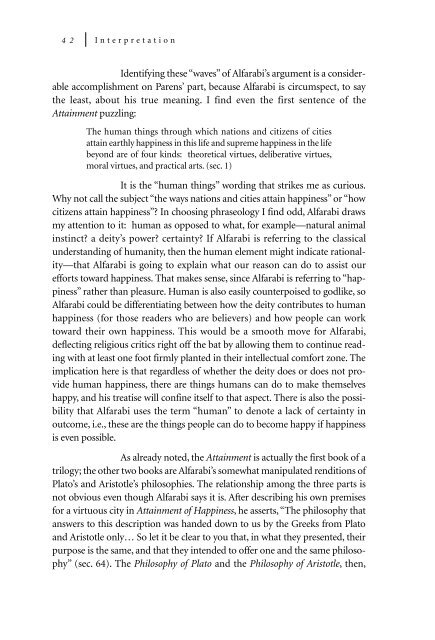Beyond Struggle and Power: Heidegger's Secret ... - Interpretation
Beyond Struggle and Power: Heidegger's Secret ... - Interpretation
Beyond Struggle and Power: Heidegger's Secret ... - Interpretation
Create successful ePaper yourself
Turn your PDF publications into a flip-book with our unique Google optimized e-Paper software.
4 2 <strong>Interpretation</strong><br />
Identifying these “waves” of Alfarabi’s argument is a considerable<br />
accomplishment on Parens’ part, because Alfarabi is circumspect, to say<br />
the least, about his true meaning. I find even the first sentence of the<br />
Attainment puzzling:<br />
The human things through which nations <strong>and</strong> citizens of cities<br />
attain earthly happiness in this life <strong>and</strong> supreme happiness in the life<br />
beyond are of four kinds: theoretical virtues, deliberative virtues,<br />
moral virtues, <strong>and</strong> practical arts. (sec. 1)<br />
It is the “human things” wording that strikes me as curious.<br />
Why not call the subject “the ways nations <strong>and</strong> cities attain happiness” or “how<br />
citizens attain happiness”? In choosing phraseology I find odd, Alfarabi draws<br />
my attention to it: human as opposed to what, for example—natural animal<br />
instinct? a deity’s power? certainty? If Alfarabi is referring to the classical<br />
underst<strong>and</strong>ing of humanity, then the human element might indicate rationality—that<br />
Alfarabi is going to explain what our reason can do to assist our<br />
efforts toward happiness. That makes sense, since Alfarabi is referring to “happiness”<br />
rather than pleasure. Human is also easily counterpoised to godlike, so<br />
Alfarabi could be differentiating between how the deity contributes to human<br />
happiness (for those readers who are believers) <strong>and</strong> how people can work<br />
toward their own happiness. This would be a smooth move for Alfarabi,<br />
deflecting religious critics right off the bat by allowing them to continue reading<br />
with at least one foot firmly planted in their intellectual comfort zone. The<br />
implication here is that regardless of whether the deity does or does not provide<br />
human happiness, there are things humans can do to make themselves<br />
happy, <strong>and</strong> his treatise will confine itself to that aspect. There is also the possibility<br />
that Alfarabi uses the term “human” to denote a lack of certainty in<br />
outcome, i.e., these are the things people can do to become happy if happiness<br />
is even possible.<br />
As already noted, the Attainment is actually the first book of a<br />
trilogy; the other two books are Alfarabi’s somewhat manipulated renditions of<br />
Plato’s <strong>and</strong> Aristotle’s philosophies. The relationship among the three parts is<br />
not obvious even though Alfarabi says it is. After describing his own premises<br />
for a virtuous city in Attainment of Happiness, he asserts, “The philosophy that<br />
answers to this description was h<strong>and</strong>ed down to us by the Greeks from Plato<br />
<strong>and</strong> Aristotle only… So let it be clear to you that, in what they presented, their<br />
purpose is the same, <strong>and</strong> that they intended to offer one <strong>and</strong> the same philosophy”<br />
(sec. 64). The Philosophy of Plato <strong>and</strong> the Philosophy of Aristotle, then,
















